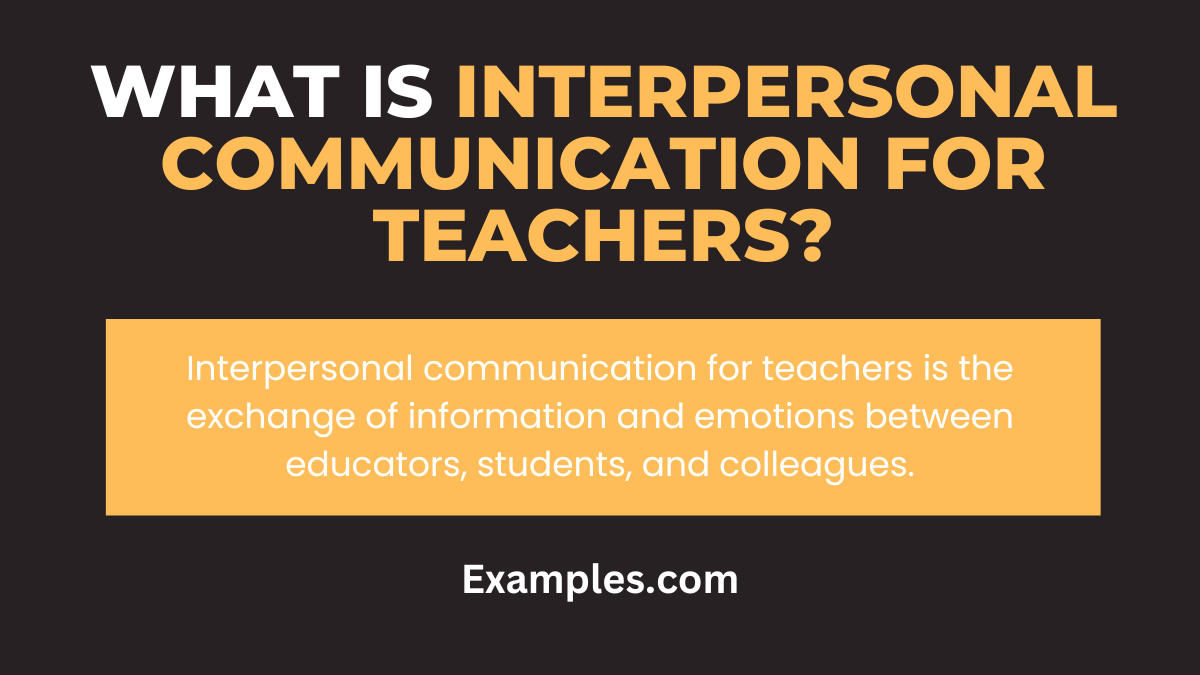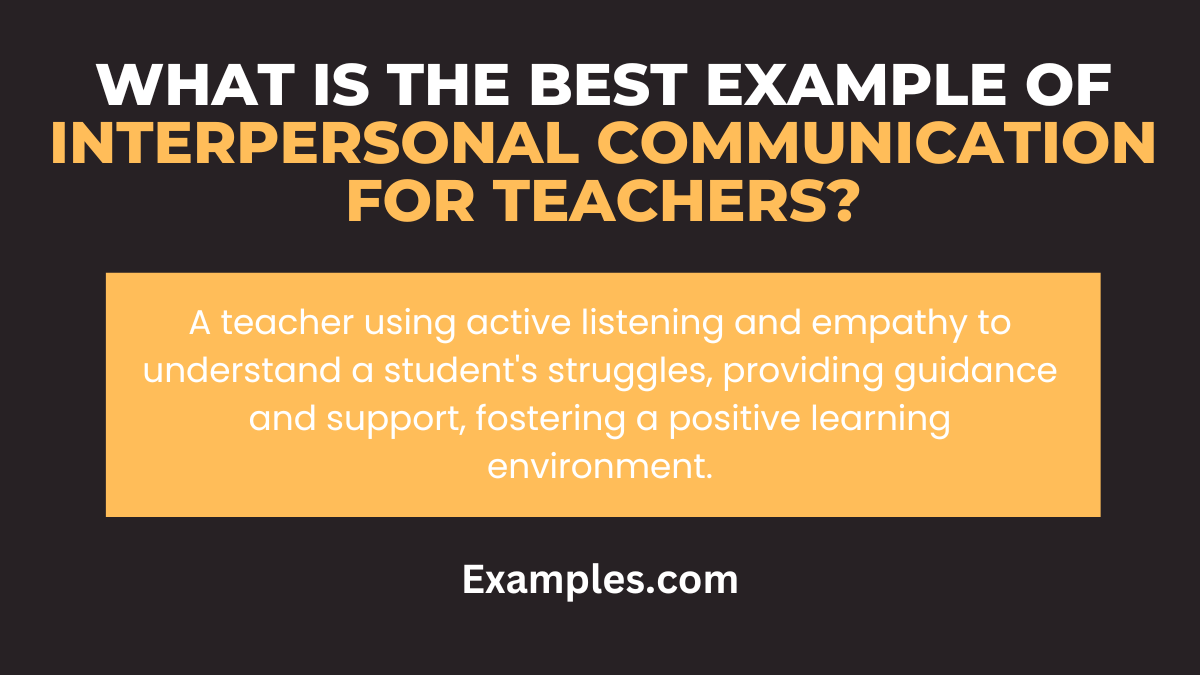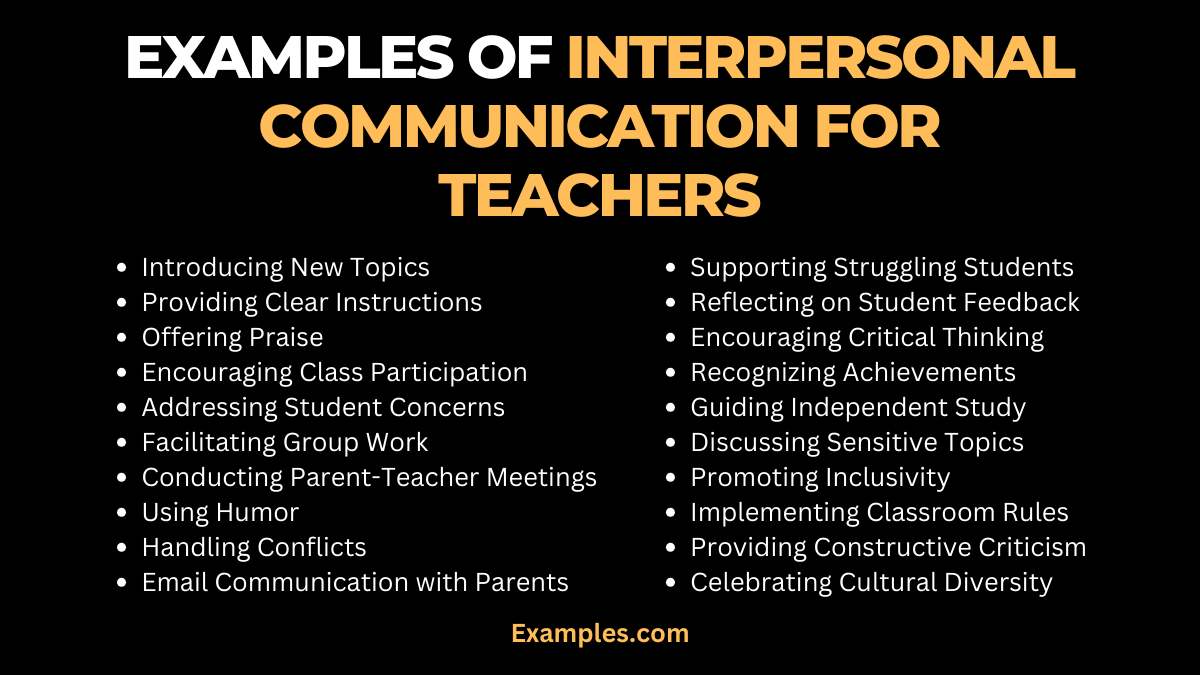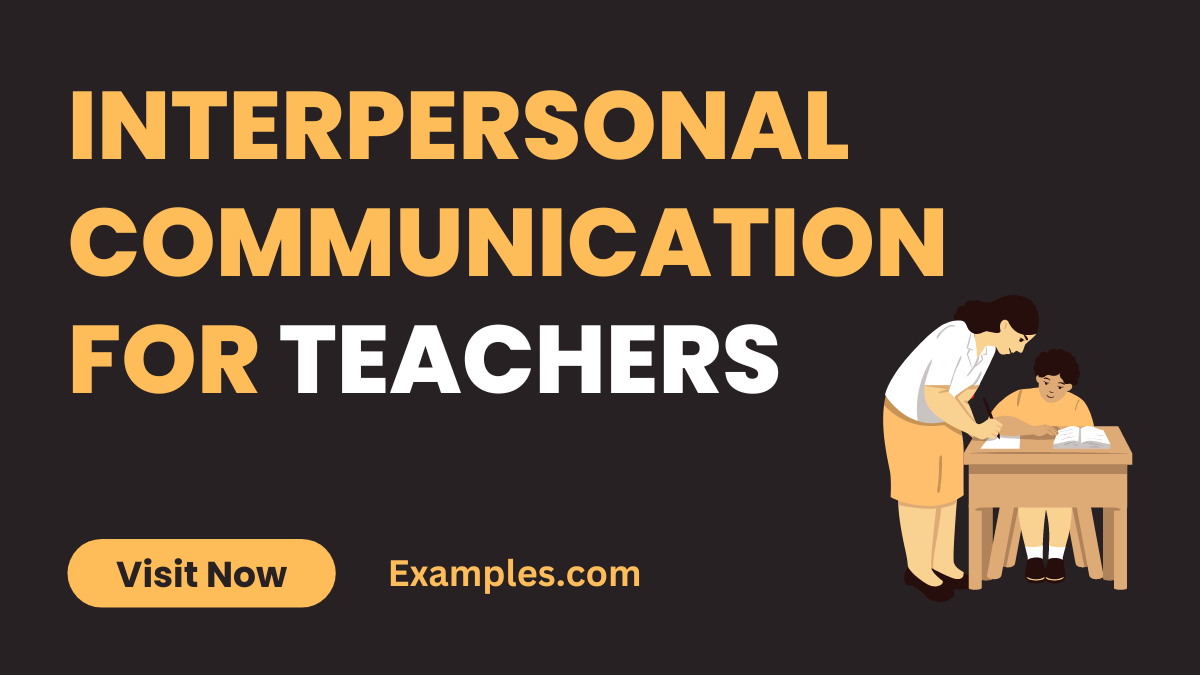19+ Interpersonal Communication for Teachers Examples
Interpersonal communication for teachers is a vital aspect of effective teaching, encompassing oral communication, active listening, and empathetic engagement. It includes various forms of interactions, from delivering lectures to one-on-one student discussions. This type of communication is pivotal in creating a conducive learning environment, where teachers can effectively convey educational content, understand student needs, and foster a supportive classroom atmosphere. Mastering these skills enables teachers to enhance student engagement, address diverse learning styles, and facilitate overall academic success.
What is Interpersonal Communication for Teachers?

Interpersonal communication for teachers refers to the varied ways educators interact with their students and colleagues. This encompasses verbal, non-verbal, and written communication, as well as digital platforms. It plays a crucial role in delivering instructions, providing feedback, understanding student perspectives, and maintaining a positive classroom dynamic. Effective interpersonal communication in teaching is essential for engaging students, managing classroom challenges, and building strong educational relationships, making it a cornerstone of successful teaching.
What is the Best Example of Interpersonal Communication for Teachers?

A prime example of interpersonal communication for teachers is engaging in open, supportive dialogues with students to facilitate learning. This includes explaining complex concepts in an accessible manner, actively listening to student feedback, and adapting teaching methods to suit diverse learning needs. For instance, a teacher encouraging class discussions, providing individualized attention, and using varied teaching aids to enhance understanding exemplifies effective communication in an educational setting, crucial for student success.
20 Examples of Interpersonal Communication for Teachers

Interpersonal communication for teachers is a pivotal aspect of educational success, encompassing a range of skills like verbal communication, active listening, empathy, and adaptability. Teachers use these skills to convey information, foster student engagement, address classroom dynamics, and support student well-being. Effective interpersonal communication in teaching shapes the learning experience, creating an environment conducive to education and personal development. The examples below demonstrate how teachers can apply various interpersonal communication techniques in their daily interactions.
- Introducing New Topics: “Today, we’re going to explore the fascinating world of Ancient Egypt.” Capturing students’ attention and interest.
- Providing Clear Instructions: “Please read chapter five and prepare a summary for our next class.” Giving straightforward task directives.
- Offering Praise: “Excellent point, Sarah! That adds a lot to our discussion.” Recognizing and appreciating student contributions.
- Encouraging Class Participation: “I’d love to hear your thoughts on this topic.” Inviting students to share their ideas.
- Addressing Student Concerns: “I noticed you seemed confused. Let’s go over that concept again.” Responding to non-verbal cues of confusion.
- Facilitating Group Work: “Let’s split into groups and each tackle a part of the project.” Organizing collaborative activities.
- Conducting Parent-Teacher Meetings: “Your child has been making great progress in math.” Discussing student performance with parents.
- Using Humor: “Why did the math book look sad? Because it had too many problems!” Lightening the mood with a joke.
- Handling Conflicts: “Let’s talk about what happened and find a way to move forward.” Mediating student disputes.
- Email Communication with Parents: “I wanted to update you on the upcoming science fair.” Keeping parents informed digitally.
- Supporting Struggling Students: “What can I do to help you understand this better?” Offering assistance and resources.
- Reflecting on Student Feedback: “I’ve taken your feedback into account and adjusted the homework load.” Adapting teaching methods.
- Encouraging Critical Thinking: “What do you think would happen if…?” Prompting deeper analysis and thought.
- Recognizing Achievements: “Congratulations on winning the science competition!” Celebrating student successes.
- Guiding Independent Study: “Here are some resources to explore this topic further.” Encouraging self-directed learning.
- Discussing Sensitive Topics: “This subject might be challenging. Let’s approach it with respect.” Navigating difficult conversations.
- Promoting Inclusivity: “Everyone’s opinion is valued here.” Creating an inclusive classroom environment.
- Implementing Classroom Rules: “Remember, we raise our hands to speak.” Setting and reinforcing guidelines.
- Providing Constructive Criticism: “You’ve made a good effort, but let’s work on improving your writing structure.” Offering feedback for improvement.
- Celebrating Cultural Diversity: “Let’s share something unique about our cultures.” Acknowledging and embracing diverse backgrounds.
Elements of Interpersonal Communication for Teachers
Effective interpersonal communication for teachers encompasses various elements essential for successful teaching and student engagement.
- Clarity: Clearly conveying lesson content and instructions.
- Empathy: Understanding and addressing student perspectives and challenges.
- Active Listening: Paying close attention to student feedback and questions.
- Non-Verbal Communication: Utilizing body language to support verbal messages.
- Feedback: Offering constructive and motivational responses to students.
- Conflict Resolution: Managing and resolving classroom disagreements.
- Cultural Sensitivity: Being aware of and respecting the diverse backgrounds of students.
- Motivation: Inspiring students through encouraging and positive communication.
Role of Interpersonal Communication for Teachers
The role of interpersonal communication in the teaching profession is multifaceted and vital for a positive educational environment.
- Facilitates Learning: Improves student understanding and participation.
- Builds Student-Teacher Relationships: Develops trust and rapport between teachers and students.
- Encourages Classroom Participation: Motivates students to engage actively in lessons.
- Supports Student Well-being: Addresses emotional and social aspects of student life.
- Promotes Inclusivity: Ensures every student feels included and respected.
- Enhances Classroom Management: Helps in creating a conducive learning atmosphere.
- Facilitates Feedback and Improvement: Aids in guiding student progress and learning.
- Supports Collaboration: Fosters teamwork and cooperation within the classroom.
Importance of Interpersonal Communication for Teachers
Interpersonal communication is crucial for teachers, significantly impacting teaching quality and student learning.
- Improves Teaching Effectiveness: Enhances the overall quality of education.
- Boosts Student Engagement: Engages students more effectively in their learning.
- Supports Diverse Learning Styles: Adapts teaching methods to different student needs.
- Enhances Classroom Atmosphere: Creates a supportive and nurturing learning environment.
- Promotes Lifelong Learning: Encourages a continuous learning mindset among students.
- Facilitates Personal Growth: Contributes to the overall development of students.
- Strengthens Communication Skills: Enhances students’ communication abilities.
- Improves Educational Outcomes: Leads to better academic performance and comprehension.
Effective interpersonal communication is a cornerstone of successful teaching. This guide has provided valuable insights and practical tips to enhance communication skills for educators. By mastering active listening, empathy, and clear expression, teachers can build positive relationships with students, parents, and colleagues. Effective communication is essential for creating a supportive learning environment and fostering academic success.



